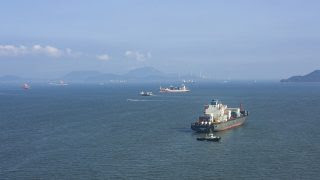The shipping industry
will not be able to achieve the 2050 greenhouse gas reduction target using
fossil fuels, the International Chamber of Shipping (ICS) pointed out.
will not be able to achieve the 2050 greenhouse gas reduction target using
fossil fuels, the International Chamber of Shipping (ICS) pointed out.
“Over the next decade we are therefore
going to require massive investment in research and development of zero CO2
emitting propulsion systems and other technologies which don’t yet exist in a
form that can be readily applied to international shipping, especially in deep
sea trades,” Esben Poulsson, Chairman of the
International Chamber of Shipping (ICS), said.
going to require massive investment in research and development of zero CO2
emitting propulsion systems and other technologies which don’t yet exist in a
form that can be readily applied to international shipping, especially in deep
sea trades,” Esben Poulsson, Chairman of the
International Chamber of Shipping (ICS), said.
“This will need to be a key component of
the IMO strategy when detailed ideas for long term measures are taken forward
during 2020,” Poulsson added.
the IMO strategy when detailed ideas for long term measures are taken forward
during 2020,” Poulsson added.
With
regard to achieving the ambitious GHG reduction targets agreed by IMO last
year, the ICS Board endorsed the finalization of proposals to IMO on short term
measures. These include tightening of the Energy Efficiency Design Index (EEDI)
for new ships – which already requires ships built in 2025 to be 30% more
efficient than those delivered before 2013 – as well as proposals for a ‘Super
SEEMP’ whereby existing Ship Energy Efficiency Management Plans could be
subject to mandatory external audits, probably as part of the ISM Code.
regard to achieving the ambitious GHG reduction targets agreed by IMO last
year, the ICS Board endorsed the finalization of proposals to IMO on short term
measures. These include tightening of the Energy Efficiency Design Index (EEDI)
for new ships – which already requires ships built in 2025 to be 30% more
efficient than those delivered before 2013 – as well as proposals for a ‘Super
SEEMP’ whereby existing Ship Energy Efficiency Management Plans could be
subject to mandatory external audits, probably as part of the ISM Code.
“We need IMO to make progress with short
term GHG reduction measures as soon as possible to achieve measurable
additional GHG reductions by 2023, in addition to the 8% total reduction
already achieved by the sector since 2008, despite a massive increase in
maritime trade over the same period,” according to
Poulsson.
term GHG reduction measures as soon as possible to achieve measurable
additional GHG reductions by 2023, in addition to the 8% total reduction
already achieved by the sector since 2008, despite a massive increase in
maritime trade over the same period,” according to
Poulsson.
“But while these short term measures are
very important we want IMO to move on to developing the critical long term measures
that will truly help the industry to decarbonise completely.”
very important we want IMO to move on to developing the critical long term measures
that will truly help the industry to decarbonise completely.”
Poulsson
further said that the 2020 sulphur cap will be the regulatory game changer of
the decade that will impact the economics of shipping.
further said that the 2020 sulphur cap will be the regulatory game changer of
the decade that will impact the economics of shipping.
“We are rapidly moving into a multi-fuel future
to be followed we hope, in the 2030s, by the arrival of commercially viable
zero CO2 fuels suitable for global application,” he explained.
to be followed we hope, in the 2030s, by the arrival of commercially viable
zero CO2 fuels suitable for global application,” he explained.
Poulsson
was speaking following the ICS Board meeting in London last week, attended by
senior representatives of the world’s national shipowners’ associations.
was speaking following the ICS Board meeting in London last week, attended by
senior representatives of the world’s national shipowners’ associations.
As
the January 1, 2020 deadline for the sulphur cap approaches, ICS members
reviewed progress in persuading the UN IMO to take measures to address expected
implementation problems. This includes outstanding safety and fuel
compatibility issues associated with the use of new 0.5% sulphur blends and
continuing uncertainty over the availability of compliant fuels in every port
worldwide, a particular challenge for tramp trades.
the January 1, 2020 deadline for the sulphur cap approaches, ICS members
reviewed progress in persuading the UN IMO to take measures to address expected
implementation problems. This includes outstanding safety and fuel
compatibility issues associated with the use of new 0.5% sulphur blends and
continuing uncertainty over the availability of compliant fuels in every port
worldwide, a particular challenge for tramp trades.
The
ICS Board concluded that it will be vital for the IMO Marine Environment
Protection Committee to complete this work at its meeting in May 2019, as
shipowners begin ordering compliant fuels.
ICS Board concluded that it will be vital for the IMO Marine Environment
Protection Committee to complete this work at its meeting in May 2019, as
shipowners begin ordering compliant fuels.
World Maritime News

